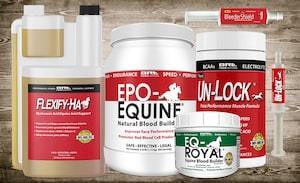
As the winter weather gets colder, it’s tempting to close up the barn and keep out the wind, but this approach could actually spell trouble for your horse’s respiratory health. Many winter horse-care practices, like feeding extra hay and closing up the barn windows and doors, can actually lead to respiratory issues. The following tips can help you care for your horse’s respiratory health this winter.
Maximize Ventilation in the Barn
Horses need ventilation for their respiratory health. If a barn doesn’t have ventilation, horses can breathe in excessive dust and ammonia fumes, leading to coughing, nasal discharge, airway inflammation and other health problems. Make sure that you always allow for ventilation in the barn, such as by leaving windows open, so that air can circulate.
Steam or Soak Hay
Feeding extra hay in the winter can help horses to keep warm and to keep weight on, but adding extra hay can contribute to the dust present in the barn. While feeding hay from a hay net will slow your horse’s hay consumption and benefit his digestive health, hanging hay up high can increase the dust and irritants that your horse inhales while eating.
Steaming or soaking hay can help to reduce this. When temperatures dip below freezing, you’ll need to soak hay in a heated space, like a tack room or heated bathroom. Place your horse’s hay in a hay net, then put the entire net into a plastic garbage can for easier soaking.
Steaming hay can offer a practical alternative when the temperatures are freezing out. While a hay steamer is a costly investment, it offers many benefits and can be used in the barn even in freezing temperatures.
Avoid Riding on Very Cold Days
Horses take in large amounts of air as they exercise, and when that air is very cold, it can be painful and harmful to your horse. As horses inhale air, their respiratory tract warms that air before it reaches their lungs. But when horses undergo intense exercise in cold air, they have to take deeper breaths, which speeds up the process and means that the air isn’t as warm when it gets to their lungs. Multiple studies have found that breathing cold air while being exercised could cause lower airway disease in horses.
There isn’t yet hard data on what qualifies as “too cold” to exercise your horse, but use common sense. If it’s painful for you to breathe in the air, your horse will probably feel the same way. Stick to a walk for the day and put off your more intense workout for a warmer day.
Incorporate Longer Wintertime Warm-Ups
When you’re working your horse in the cold weather, you may notice that he starts coughing during the beginning of the ride. A long, slow warmup can help him acclimate to colder temperatures, and it’s also important in preventing injuries. Wait until your horse’s coughing stops before asking him to perform more intense exercise. If the coughing continues, call your vet.
Use BleederShield
If your horse has EIPH-damaged lungs, using BleederShield can help to support the lungs and blood vessels, reducing the risk of a horse suffering from EIPH. Yunnan baiyao, the active ingredient in BleederShield, has been scientifically shown to minimize blood loss in horses. Best of all, BleederShield is drug-free and will not test.
With BRL Equine’s 90-day money-back guarantee, you can try BleederShield risk-free. Order today and see the difference it can make for your horse.
Top trainers, owners and competitors rely on BRL Equine products to help their horses perform at their very best. You can get the same great results! Our all-natural equine nutritional supplements really work... guaranteed or your money back!





Also in Horse Tips and More
Top 10 Ways to Show Your Horse You’re Thankful For Him
November 01, 2021
View full article →
5 Ways to Prepare Your Barn For Summer
May 03, 2021
View full article →
Your New Spring Horse Health Checklist
March 12, 2021
View full article →